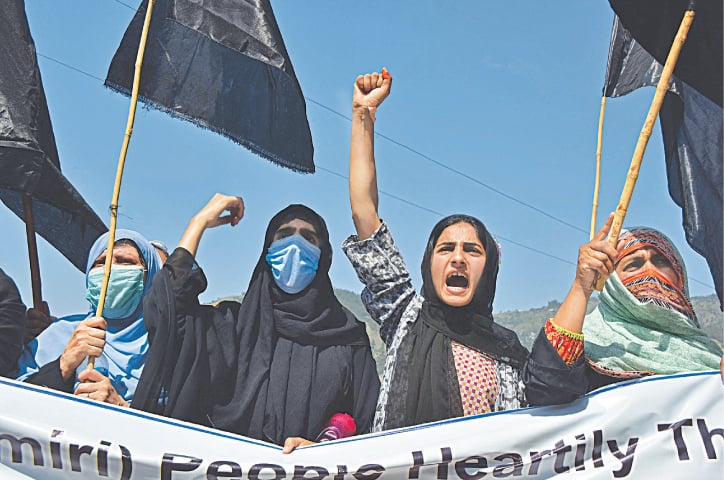Shahzad Sharjeel
Published May 24, 2023


THESE days some people go about introducing themselves as ‘thought leaders’. This claim is neither determined nor tested by the number of followers they may have; it is completely self-assessed but inflicted upon others.
According to the New York Times, there is a monthly coming together of university professors and TikTokers who were fired and banned because of their ‘views’. They are playfully called the ‘cancelled club’.
Post-May 9, it is dangerous to bring up anything even remotely related to the security establishment, be it something as hard as a tank or as soft as a trouser without raising eyebrows, but let’s ask anyway whether the tank people are facing competition over who wears the pants in the household. Or should the PTI be considered a ‘cancelled club’ henceforth?
Spiritual and religious symbols and relics generally come about organically and their sanctification doesn’t usually require coercive enforcement. Though places of worship, shrines, and mausoleums are not immune to ‘capture’ by profiteers like hereditary spiritual lineages and clergy, their origins are rooted in love, reverence and certain socio-emotional and economic service delivery.
National symbols like anthems and flags; the elevation of personalities to national heroes, and ideologues’ status, and the appropriation of literary/philosophical oeuvres as national ideology require much narrative-building, propagation and enforcement.
Their deification is seldom left to voluntary adherence and disrespect to them is declared a cognisable offence. The state builds these symbols and narratives and erects monuments to direct and control the population’s loyalty, energy and emotions, in keeping with the ruling junta’s worldview and agenda.
A traditional lot of religious-spiritual and cultural symbols and edifices are used as raw material for state-sponsored idol-making and are dragged into the fray of power play where no permanent friend or foe exists.
The state builds narratives in keeping with the ruling junta’s view.
In the jostling for power and ideological space, the contenders attack the soft targets first; blowing up girls’ schools has the same legal consequence, if at all, as causing damage to any public property. Attacking hard targets like national monuments and security installations poses a different level of difficulty and supposedly far dire consequences.
The attackers’ collective identity, their past services as proxies, and future value as cannon fodder determine the punitive actions against them. A Taliban spokesman can ‘escape’ captivity, but Baloch nationalists or PTM experience no such lapses or inefficiency.
Imagine the response had the attack on the corps commander’s house (Jinnah House) been located elsewhere, ie, heaven forbid in Quetta. What if instead of GHQ, the cantonment at Pannu Aqil, Sindh was attacked? Restraint and sangfroid would be the last thing on the platoon’s mind.
The nonchalant reaction of the security establishment and ‘misled brethren’ mantra by religious-political parties in the face of countless attacks on schools and bazaars, plus the nonstop appeasement through a series of peace agreements with militants eventually led to the precedent-setting attack on GHQ in Pindi in 2009 and the 2011 Mehran Base attack in Karachi.
The state-led shrinkage of space for plurality, plus the ‘good’ and ‘bad’ militants approach espoused brazen attacks on Muslim as well as Christian, Hindu and other minorities’ places of worship. Attacks on Rehman Baba’s grave, Data Darbar and the Qalandar’s mazar were the harbingers of what happened on May 9.
The wrangling over the legal system to bring the culprits to book, and any selective justice across the uniformed and the civilian lot will only erode whatever little remains of national institutions. Reprieves under local compulsions or foreign pressure will only confirm the state’s discrimination among citizens; the children of the lesser components of the federation will feel further alienated.
How come May 9 is already referred to as a ‘black day’ but the days when Liaquat Ali and Benazir Bhutto were assassinated, or the APS massacre occurred are not? Many monuments were dismantled throughout the former USSR after communism’s retreat was marked by the pulling down of the Berlin Wall.
Whose victory does May 9 herald? Both animate and inanimate idol-making factories are sometimes located abroad. BJP had to turn to a Chinese factory to at least partially bronze cast Sardar Patel’s record-setting statue erected in Gujarat. At home, we may just rely on foreign design and money; the rest can be manufactured at factories in Lahore, Rawalpindi, Akora Khattak, etc.
The cycle of

(carved, worshipped, broken) shall continue.
The writer is a poet. His latest publication is a collection of satire essays titled Rindana.
shahzadsharjeel1@gmail.com
Published in Dawn, May 24th, 2023
















